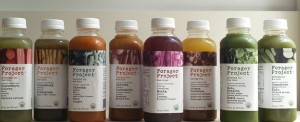Natural Products Expo East in Baltimore last week confirmed that high pressure processing (HPP) is indeed the hottest trend in beverage business on the natural side – the next proof point will likely fall to consumers.
Still, pricing remains an issue.
“I wouldn’t buy my kid a $12 juice,” said Green Shoots founder Nat Noone, who has made bets on HPP products with a lower price point.

Indeed, at Expo East, new brands like Drink Me, Tumeric Alive and Love, Sam joined fast-growing Suja – at little more than a year in RTD, it qualified as a mature brand already – as brands that were planning to storm the cold box at Whole Foods and other smaller cutting-edge chains.
Those four companies fit with a broader set of West Coast-based products, including Evolution Fresh and the smaller Forager Product, as well as Hain-owned BluePrint – as brands that are setting up a new tier in the super-premium juice category, and knocking Naked (owned by PepsiCo) and Odwalla (owned by The Coca-Cola Co.) down a peg.
Indeed, a highly-placed Whole Foods source confirmed for BevNET shortly before Expo East that Naked, Odwalla, and other brands are seeing their footprints reduced through SKU rationalization in some regions to make way for both HPP juices and for those made with non-GMO (Genetically Modified Organism) ingredients.
For some juice companies, it has appeared that Naked has even been discontinued in West Coast accounts, although that may be a result of product waning on Whole Foods shelves as Naked seeks non-GMO verification for some of its products.

The Suja Elements line is “designed to be a Naked killer,” according to a highly placed executive at the brand, who confirmed that it is expected to be in all Whole Foods regions in the U.S. as a featured part of the grab-and-go cooler that has helped Naked and Odwalla thrive.
From a merchandising perspective, the sub-line is not supposed to go near the Suja core SKUs – “it’s not a Suja killer,” the executive added, “they want us to go as deep with them and as far as we can.”
But while Suja – as well as BluePrint and Evolution Fresh, which also recently added new Whole Foods-focused SKUs at more wallet-accessible prices – is trying to build a national presence in the chain, it’s apparent that those companies will also be squeezed by HPP brands trying to grow locally or regionally.
At Expo East, Love, Sam appeared to be heading that way. While its booth was thrown together at the last second, the brand was one that had the trade buzzing because of the story behind it: Sam is Samantha Levin, the girl from Fresh Samantha, one of the first “fresh juice” brands in the Northeast, which, despite being quickly absorbed by competitor Odwalla and eventually dropping from sight, left a legacy of sales and marketing talent and at least a strong twinge of recognition among Whole Foods consumers in the Northeast (if social media inquiries put out by BevNET can serve as an indicator – and in this case, it appears that they can).
Clad in a hippie-chic peasant dress, the now early-20s Levin is fresh out of Bowdoin and has a six-SKU line of HPP juices that’s intended to follow the Boston/New York/D.C. axis of the original Fresh Samantha distribution pattern. Adding to the intrigue behind the story is that Love, Sam’s distributor will be high-profile Whole Foods-focused DSD operation Green Shoots, started by Noone, a former Fresh Samantha salesman.
As Levin doled out samples of her products (Betty Beet, Sweet Mr. Green, Senor Mango, Swinging Stawberry, and Carrot Ginger Carlotta were on display at Expo East), she said that, while they carry the same on-trend imprimatur as her cold-pressed, organically-focused profile as its competitors, at between $4 and $5 per bottle it was intended to “cleanse your body, not your wallet.”
Part of the way the company plans to keep costs low, according to Noone, is to keep the products available only on the East Coast, near places where its core ingredients are readily available. He said he’s working a similar strategy on the West Coast, where Green Shoots is working with the more veggie-focused Forager Project, run by former First Beverage analyst J.C. Hanley.
Family connections run deep with that product line, as well: Hanley’s stepfather, Stephen Williamson, is a former CEO of Odwalla (including helming the company at the time it acquired Fresh Samantha). Hanley, Forager’s 26-year-old CEO, told BevNET recently that he is working closely with Williamson on all aspects of the company, which is now in the Whole Foods Northern California, the Pacific Northwest and the Rocky Mountain regions.
“I’ve been around juice forever,” Hanley said. “Our family was kind of the test kitchen for Odwalla back in the old days.”
Experience aside, the presence of the regional brands – as well as the out-of-channel competition from places like small chains of fresh-pressed juice bars that are fast appearing in most cities – were clearly more on the mind of Suja brass than their predecessors in the cold box.
“We’re trying to prepare ourselves,” said CEO Jeff Church, who noted that one key mark for all of the HPP brands will be when they migrate not just nationally through Whole Foods, but into mainstream channels as well, where margins – and retail prices – can be tougher to maintain. “We can either try to enjoy the margin umbrella for a nice period of time, or take pricing down if we need to.”
